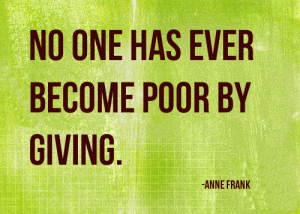It’s International Day of Charity on 5th September – there are so many ways to support a charity, so why not give one of them a go!
Supporting a great cause helps the charity to continue their life-changing work, and makes you feel that you’ve made a bit of a difference. On top of that, there are benefits for your small business when you give to charity.
Giving to charity doesn’t have to just be about money, it can also include volunteering services or donating stock. All are forms of charitable giving.
Giving a donation
If you make a donation and don’t receive anything in return (apart from a good feeling!), then this is classed as a straightforward donation. If you do receive a public thank you or a mention in a newsletter, then that’s fine. Promoting your company’s links with your chosen the charity can help build a positive image too.
If your company donates (it has to be a donation from the company rather than from a sole trader or partnership), you can deduct the value of your donation from your company’s total profits when you calculate your Corporation Tax. For how to claim, visit the HMRC website.
Sponsoring an event
Your company could sponsor a charity event or project, by giving the charity a one off payment or a regular amount.
In return for your sponsorship amount, you may benefit from advertising campaigns or publicity, promoting your company brand or product in conjunction with the event or project you’ve sponsored, potentially reaching a wide audience.
Your business may be able to deduct the sponsorship payments as an expense when you work out your profits for tax purposes. For more information on sponsorship and the tax benefits, visit HMRC.
Giving your time and expertise
Most charities couldn’t operate without their volunteer workforce – it is vital to their existence.
Volunteering your services will give the charity valuable expertise. If one of your employees works or volunteers for charity on a temporary basis or on a secondment, your company can continue to deduct the costs of the employment, including the employee’s salary for tax purposes. (This applies to sole traders, trading partnerships and companies with a trading or investment business). You may also be able to claim other expenses, so for more information visit HMRC.
Giving shares, property or land
You can’t give shares in your own company to a charity, but you can give ‘recognised shares’ in other companies, land and property as a gift. You can claim corporation tax relief for such gifts, and you can claim relief if the gift is sold to the charity for less than the market value. For more information on how to give, and how to claim tax relief visit HMRC.
Giving equipment or stock
Giving equipment or stock are both considered as ‘gifts in kind’ and you can get tax relief. Company equipment, such as office furniture, computers, printers, cars/vans, tools and machinery all count, but they have to have been used in ‘your normal business activities’ to qualify.
If you donate goods that your business makes or sells – your ‘trading stock’ – to a charity, then you can claim the cost of these goods in your business accounts, reducing your business’s taxable profits by the full cost of the goods. For more information, go to HMRC
Payroll Giving
Setting up a Payroll giving scheme is a great way to help a charity. Payroll giving enables your employees to give to their chosen charity directly from their gross salary, before the tax is deducted, making the donation worth more to the charity. It also allows charities to budget ahead, providing them with regular, reliable income.
The costs of setting up a scheme and the small ongoing costs of running a scheme are deductible for tax purposes and help support corporate social responsibility (CSR) schemes too. For more information, visit the Payroll Giving Centre and HMRC, for how to set everything up.
Giving is good!
So giving is good – not just for the charity, but for your business too!
For more information on what you can and can’t claim, and how to claim any tax benefits, then visit the HMRC and The Institute of Fundraising.
Have a look here for more information about International Day of Charity

